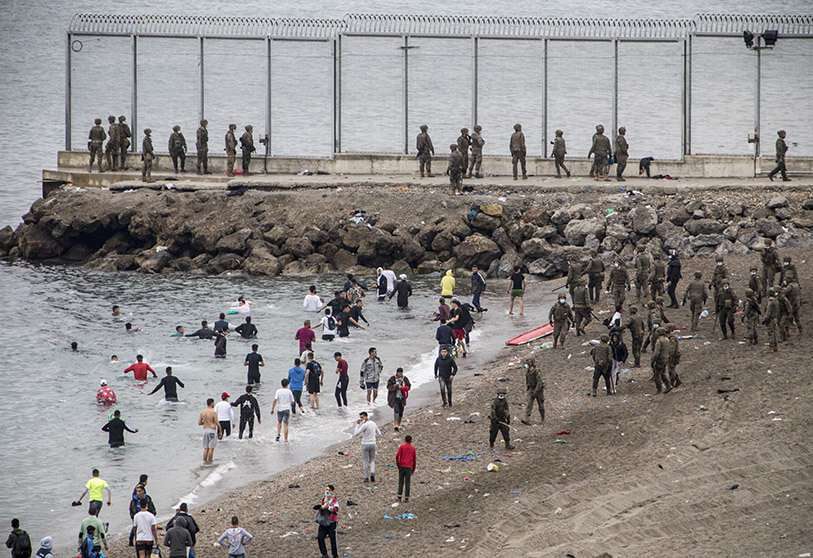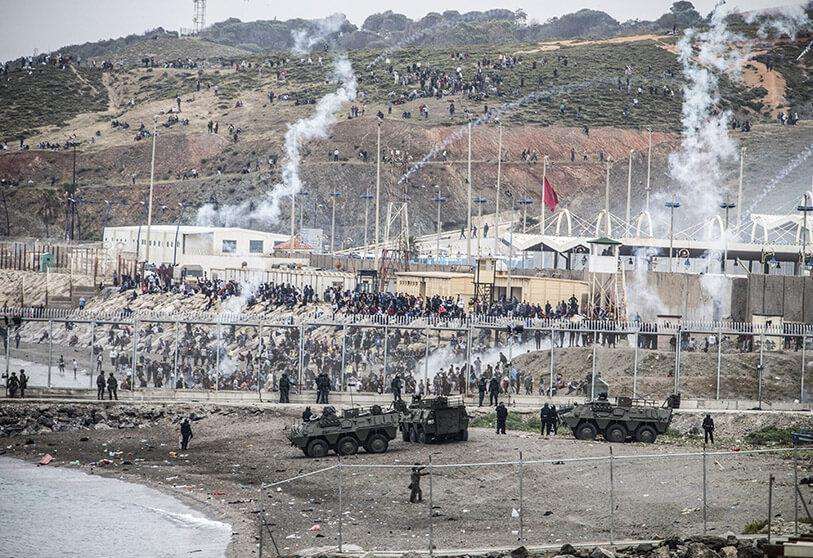El islote de Perejil, lecciones aprendidas: “La propaganda por el hecho”

Nineteen years have passed since the last diplomatic dispute between Spain and Morocco. The islet of Perejil was sufficient cause for the Spanish state - since the arrival of democracy after Franco's death in 1975 and the Green March - to use the armed forces to defend its national sovereignty over the territory.
Today, however, events such as the Moroccan migratory phenomenon and the Alawi maritime delimitation laws bear similarities to the real "symbolic war" being waged in the media and mass-media over the Perejil islet.
Looking back, "propaganda by deed" has proven to be one of the most effective political instruments. However, as an instrument of pressure and mismanaged, it can lead to real conflict.
What do current bilateral relations between Spain and Morocco have to do with those of 2002? How important is it to act proactively so as not to make the same mistakes again?
We would like this analysis to be free of despair. It so happens that we choose to see the glass as half-empty as a healthy habit of creating ideas that allow us to continue filling it.

The facts
On 11 July 2002, twelve Moroccan gendarmes took up residence on the Perejil islet, known as Laila in Arabic and Tura in Berber. These events gave rise to a diplomatic conflict between Spain and Morocco, which after five days led to the military operation Romeo Sierra in which the Spanish state, for the first time since the beginning of the democratic era, was forced to defend its sovereignty.
After almost two decades, it has been demonstrated that the Moroccan occupation, the Spanish military operation and all the media repercussions it entailed cannot be classified as an act of war in itself.
The islet of Perejil is an uninhabited piece of land of little value located barely 200 metres from the African mainland and less than 10 kilometres from the city of Ceuta. The island, which is about the size of five football fields, was the source of a crisis that exploded into a media event. Beyond the enormous relevance it had in Morocco and Spain, the dispute went beyond the international sphere. Both the national and international mass media focused on the event, leaving in the shadows even more important events such as the war in Afghanistan that began in 2001.
What happened in 2002 was a conflict that, seen in perspective, was more akin to a "war for information". At the national level, positions on dissidence varied and were divided.
On the one hand, Spanish newspapers such as El Mundo were committed to an ironclad defence of Spanish sovereignty over Perejil and interpreted the Moroccan occupation as an aggression in the face of which Spain was fully within its rights to intervene militarily in legitimate self-defence.
On the other side appeared media outlets such as El País, which defended the same values and advocated a diplomatic solution as opposed to military action. The operation was described as "disproportionate" while at the same time boasting neatness, transparency, diaphanousness and military efficiency.
However, in contrast to the diversity of domestic opinion in Spain, the Moroccan media maintained a position that seemed to be in tune. Headlines in reputable magazines, such as Le Maroc Hebdo, focused on categorising the Spanish response as asymmetrical and unbalanced. Moroccan news reports that week criticised Spanish sovereignty over Ceuta and Melilla as mere colonial memory.
The balance of interests over the islet of Perejil went beyond sovereignty over the territory, which, in reality, mattered little to both states due to its low value at all levels. The party that would emerge victorious from the diplomatic conflict would be the one that managed to obtain the greatest international support and defence, a favourable report from supranational organisations and a favourable judgement from public opinion.
The military intervention that would unfold in a few hours would take a long time. The fact that the Perejil conflict has been described as a "symbolic war" or "information war" is due to the repercussions of the events both at the institutional level and in the media. Numerous acts of vindication, declarations, symbolic scenarios, allegations and counter-allegations appeared from different positions with the intention of achieving the three objectives mentioned in the previous point, above all, international support.

The central instrument, which until now had not been applied habitually by any of the parties, was "propaganda". As is well known, this is a tool that can be applied in different fields such as commerce, politics, sociology and many others. It is an ancient form of communication whose sole purpose is to influence the attitude of a community towards something.
Among the various forms of propaganda, there is one that is highly effective: "propaganda by deed". Propaganda by deed was born in 1877 in France, at the hands of anarchist terrorism. The concept began to be used based on the idea that shocking events would have a much greater influence on the working class.
It is important to note that the propagation of the event does not take place in the hope that a revolution will start, but are simple "acts of defiance against the authorities", capable of exerting a media pressure that goes beyond oral and written propaganda whose reach and impact is less. This is logical, since it has been proven that the impact of an idea is much greater if it is accompanied by an action that backs it up.
In view of the above, and given our lack of knowledge of Moroccan strategy, we cannot qualify the facts as such. However, it can be affirmed that the occupation of the islet had the consequences of propaganda.

Once "the facts" had been established, the propaganda would take effect. Morocco's message in response to what had happened was fourfold:
- The first pillar justifying the interference was to consider the actions as a "police surveillance operation" against immigration and terrorism, something routine.
- The second pillar focused on claiming both the islet and Ceuta and Melilla, making a comparison with Gibraltar.
- The third link focused on consolidating a pacifying and mediating discourse in the international arena, leaving Spain in a compromising position with respect to its actions.
- Finally, victimisation: after the end of Operation Romeo Sierra, Morocco presented itself as the victim of aggression and even equated the events with a 'declaration of war'.
In this way, the Moroccan media turned the events into an effective means of propaganda. Spain, for its part, was dedicated to countering the "propaganda" coming from Morocco.
- Faced with the Moroccan version of a 'routine police surveillance operation', the government made an effort to highlight its military and early response capabilities in the face of an occupation such as that of the islet.
- As for Ceuta and Melilla, the Spanish state increased its security in the area.
- With respect to its pacifist approach, Spain declared itself in favour of peace, making clear at all times the inalienability of Ceuta and Melilla.
- Finally, with regard to Alawi victimhood, Spain maintained at all times that it used legitimate self-defence based on prior aggression.
Ultimately, the Spanish response was effective at the national level, as it won the support of the majority of the population. Around 80 per cent agreed with the military intervention, as did those in favour of maintaining good relations with Morocco.
At the international level, however, the results were different. In general, the world press emphasised the irrational and localist nature of the conflict, giving greater emphasis to other issues of confrontation between the countries, such as the sovereignty of Ceuta, Melilla and Western Sahara.
In the US, where the crisis was described as comical, the media adopted a pro-Moroccan stance, accusing Spain of acting in a high-handed manner and inciting anti-Western sentiment in the Arab world.
In Europe, with the UK and France as the main representatives, they patronised Spain. France strongly criticised the Alawite bungling, while the UK took the opportunity to lay claim to the Rock of Gibraltar.
Ultimately, the occupation and the military response resulted in Spain coming under the international spotlight, drawing unnecessary criticism and reopening a debate on the sovereignty of Ceuta and Melilla that had been settled years earlier.
Until now Spain had not been open to discussing the sovereignty of the cities, but these events not only put pressure on the Spanish government to speak out, but also managed to reopen the debate at the international level.

The Perejil conflict was a 'symbolic war' and a 'war for information' in which Spain saw its image damaged at the international level and which also allowed the debate over the sovereignty of Ceuta and Melilla to be reopened.
For this reason, and in keeping with history, the current bilateral crises between Spain and Morocco - the migration crisis, the delimitation of Canary Islands waters, phosphate deposits, the Canary Islands-Saharan fishing banks and the recognition of Western Sahara - should be studied and resolved as quickly as possible.
At the end of 2020, the 12th High Level Meeting (HLM) between Spain and Morocco was postponed until February 2021. However, it has been postponed again, citing the epidemiological situation and the government's calendar. It seems that there is little room for manoeuvre to finalise a meeting at which important bilateral agreements will be initialled.
Last December, in the face of UN Podemos' alignment with the Polisario Front and the demand for a referendum on self-determination for the Sahara, Rabat's prime minister declared: "Ceuta and Melilla are Moroccan like the Sahara".
However, the problems of the present are often solved by learning from the setbacks of the past. The "information war" and the setback of "propaganda by deed" are a master class for the upcoming HLM XII.
Nevertheless, we must also take into consideration the effectiveness and determination shown by King Juan Carlos Emeritus in elevating relations between the two Royal Houses in the face of the parsley crisis.
The strength and vitality that characterises Spanish-Moroccan relations, accentuated by a common history and culture, should be sufficient cause for the conflict to be resolved without the need for propaganda and military intervention. The next HLM should therefore be the starting point for reaching a healing agreement.
Article published in the International Observatory on Security, Organised Crime and Terrorism (OISCOT)








